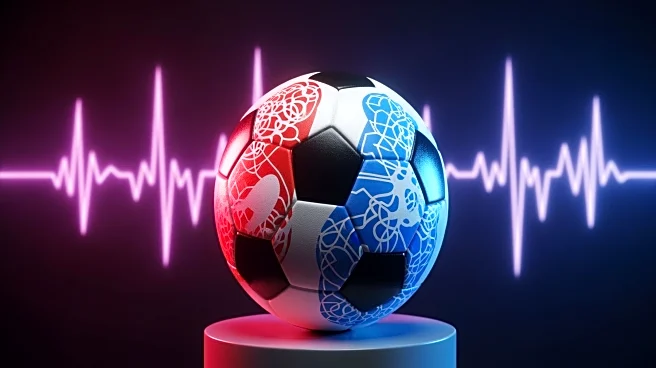What's Happening?
Researchers have conducted a study on the brain activity of soccer fans, revealing that certain areas of the brain are activated when fans watch matches involving their favorite teams. The study, published in the journal Radiology, highlights how these
neural circuits can trigger strong emotional reactions, both positive and negative, depending on the game's outcome. The research suggests that the mechanisms driving sports passion may also underlie other forms of fanaticism. The study involved scanning the brains of 60 male soccer fans using functional MRI (fMRI) while they watched clips of their team scoring against rivals. The findings showed that rivalry significantly affects brain activity, with increased reward circuitry activation during victories and suppression of control signals during defeats.
Why It's Important?
This research is significant as it provides insights into the neurobiological mechanisms of social identity and emotional responses in competitive settings. Understanding how rivalry and fanaticism affect brain activity can inform strategies for managing crowd behavior and preventing violence at emotionally charged events. The study's findings have broader implications beyond sports, potentially informing approaches to political and sectarian conflicts where intense group identity can lead to polarization and violence. By identifying the neural processes involved, the research could contribute to developing communication strategies and interventions to mitigate the negative impacts of fanaticism on public health and social cohesion.
What's Next?
The study's authors suggest that further research could explore how these neural mechanisms apply to other forms of fanaticism, such as political or sectarian conflicts. There is potential for developing strategies to enhance cognitive control and reduce impulsive reactions during high-stakes moments. Additionally, the research emphasizes the importance of early childhood development in shaping these neural circuits, suggesting that protecting childhood environments could be a powerful prevention strategy against fanaticism. Future studies may focus on testing interventions that can strengthen cognitive control and promote healthier social identities.
Beyond the Headlines
The study highlights the ethical and controlled nature of using soccer fandom as a model to study fanaticism, offering lessons that could apply to broader societal issues. The research carries urgency amid global tensions and political polarization, with implications for strengthening democratic cohesion and public health. By understanding the neural mechanisms of fanaticism, societies can develop informed prevention strategies that protect against the harms associated with intense group identity.

















